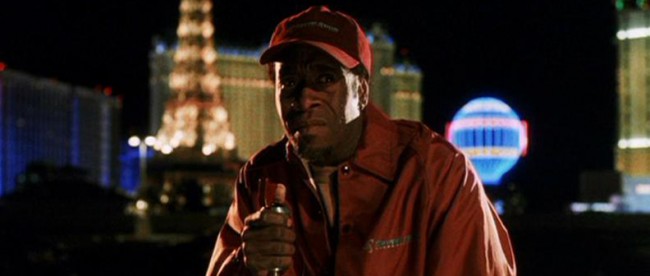I Hadn’t a Scooby About This One

In the 2001 remake Ocean’s Eleven, Danny Ocean (played by George Clooney) puts together an eclectic group of con artists and thieves in an attempt to pull off perhaps the world’s greatest casino heist. Among the near-dozen gang members is an English munitions expert named Basher Tarr (Don Cheadle), whose core job is to create a blackout in Las Vegas to provide some cover from the casino’s electronic monitoring systems. Unfortunately, something goes wrong and as Basher tells the other ten members of the group, “unless we intend to do this job in Reno, we’re in Barney.”
Don’t know what that means? Don’t feel bad — neither did the other ten of Ocean’s eleven. They looked at Basher with a collection of confused looks, so Basher replied with an explanation:
In other words: Basher couldn’t make the power go out and the whole plan was “in trouble.” But what does that have to do with the Flintstones?
Cheadle’s character in the movies is using something called “Cockney rhyming slang.” Rhyming slang, which dates back to the 1850s, is odd linguistic construction from an informally-defined area in London’s East End (probably) known colloquially as “Cockney,” hence the name. And if you’re not natively familiar with the examples that have permeated the culture, it’s almost impossible to reason out the meaning of the phrases that you’ll hear from someone speaking it.
Cockney rhyming slang follows a strange formula. First, take a common word — “clue,” let’s say — and then find a phrase whose last word rhymes with it. Ideally, that phrase also has something to do with the common word it rhymes with, so in this case, let’s go with “Scooby Doo,” the protagonist pup from the famous cartoon franchise. Scooby-Doo and crew were detectives — always looking for clues! — so “Scooby Doo” makes for a good replacement for “clue.” So far, so good, and something a non-Cockney rhymer could probably discern. But then it gets a tricky, as the rhyming slang typically drops the last word, which, frustratingly, is also the rhyming word. As a result, “I haven’t a clue” becomes “I haven’t a Scooby.”
The reason for this linguistic development has been lost to history. It may have been something that happened organically or perhaps as a joke. But it may have had a more practical purpose, as one historian proffers (via Wikipedia): Cockney rhyming slang may have been “invented by Irish immigrants to London ‘so the actual English wouldn’t understand what they were talking about.'”
Like the origins of the rhyming culture, the etymologies of many Cockney rhymes themselves have also been forgotten along the way. While some were recorded along the way, many others have instead found themselves some false etymologies along the way. For example, Basher almost certainly was wrong to attribute the “Barney” to “trouble” link to Barney Rubble; the “rhyme” almost certainly predates the cartoon (and originally mean something closer to “to get into a fight.”)
There are many other examples of Cockney rhyming slang, but there’s no need to guess at their meanings if you don’t want to. Thanks to the wonders of the Internet, there’s a website dedicated to the slang, replete with hundreds of definitions that you’d never otherwise guess.
Bonus fact: Don Cheadle is uncredited in Ocean’s Eleven and it’s unclear why. In 2009, he sat down with film critic Kam Williams, offering the following explanation: “there was some stuff that happened behind the scenes that I didn’t like how it went down, so I just said, ‘Take my name off it.'” Neither Cheadle nor the producers have offered a subsequent explanation, but whatever the issues were, they were paved over; Cheadle appeared, credited, in the two sequels.
From the Archives: Putting It Together Again: As rhymes go, few are as famous as the one about Humpty Dumpty. You probably think of him as an egg — but the rhyme never actually says that. Here’s the explanation.
Related: “The Little Book of Cockney Rhyming Slang” by Sid Finch. Also, Ocean’s Eleven.
